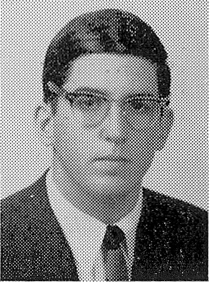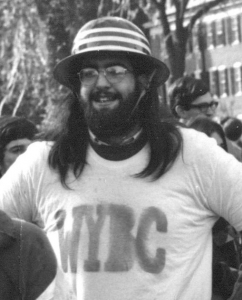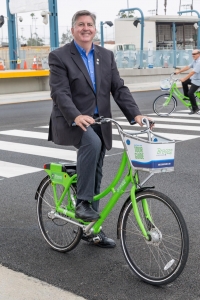WYBC: Kevin McKeown

Almost immediately upon arrival at Yale, in fall of my freshman year, it became a nightly ritual for the four rooms on my floor of Welch Hall to come together and play the nightly contest on WYBC’s “Stardust.”
The hope of winning a Naples pizza was part of it, as was the amazement over what radio could do if not bound by the FCC. The contests were often obscene, or at least the winning answers usually were, and WYBC-AM, “closed circuit to the Yale campus,” played some politically incorrect singles. That unrestrained radio and a little alcohol made for a dorm party almost every night.
When time came in the winter of ‘65-66 for freshmen to heel campus organizations, there was no doubt where I wanted to be. A physics major, I heeled in “tech,” and during spring break helped build the new FM studio that a year or so later would become home to the first progressive rock programming in southern New England.
As we glued sound tiles to the walls of the new studios, we hid “time capsule” notes behind them. I wonder if any were ever found.
I soon left tech for programming, eventually becoming music director for WYBC-AM (the FM was not yet playing rock). A red-headed sales clerk at Cutler’s on Broadway got me to buy an unknown band’s first American single, “I Feel Free,” and with that song by Cream, the changes of the next two years were foreshadowed.
It turned out that things I’d learned at WYBC, like being able to cue a record and back-time to a newscast, were actual job skills, which got me in the door at a local real radio station “running the board” for a Sunday night oldies show. A few months later, I was entrusted with reading the news! Pretty soon I was on-air as a disk jockey in both New Haven and Hartford (for one harrowing vacation relief shift in the summer of ’67, in both cities at the same time).

By 1968 I was working at New Haven Top 40 outlet WNHC, complete with peppy jingles and inane promotions. But happy pop music seemed less and less relevant as the painful politics of a wrenchingly unpredictable year unfolded. Spring was punctuated by assassinations. Summer brought a convention — of our party! — that devolved into a police riot.
Revolution was in the air, and it revolved at 33rpm, not 45. Revolution was on the air, but at WYBC, not WNHC.
For three long years, I collected my paychecks as a “boss jock,” but spent all my time outside of work at WYBC, where album rock reflected the times. Finally, in 1971, WNHC’s ignored FM signal was reinvented as WPLR, a weakly progressive format at first, but one where I could take over night times and play pretty much whatever I wanted. I moved on to KGB in San Diego, and eventually became general manager of the last of the free-form FMs in Los Angeles, KROQ.
Our class, our generation, knows how important radio became as the counter-culture gathering place, the one media outlet for the view of the world that our generation was inventing. Every station I worked at was fiercely political, presenting an alternative lifestyle which, at that point, had not yet been co-opted by the mainstream media.

Did I say political? Little surprise, then, that I ended up as Mayor of the small coastal city of Santa Monica. The arc of my life was bent to politics early, in large part because of what we all did at WYBC in the summer of ’68.

But, Kevin, you didn’t mention being in the Hillhouse H.S. Class of 1965—as I was! Santa Monica is a great place but I never knew it had a Yalie Mayor.
Jonathan Bell, New York City
I was indeed both a townie and a Yalie, but Hillhouse class of 1964, not 1965. I’d been skipped two grades early in parochial school, and graduated high school barely 16. Yale granted me both a scholarship AND a free year at an upstate prep school (Suffield) to grow up a bit.
Hey Kevin,
The NYT has an ad for a trip to Quebec City for $5500. What did we spend for the 5 of us? Maybe $55?
those were the days,
Charlie & Gale Carignan
That NYT package probably doesn’t include the thrill of saying Hail Marys in the back seat of Jim Minor’s sports car while being pursued at a high speed by angry Quebecers after an unfortunate, and, in retrospect, inexplicable incident involving a firecracker and a mailbox.
Kevin
Hey, wait a minute, that was my Singer Gazelle we drove to escape Quebecois retribution. Jim Minor was in charge of dropping the Scotch bottle.
I never went back.
And so becomes revealed the imprecision of even the most vivid of memories after five decades. So who led the back-seat rounds of plaintive Hail Marys? And by the way, congratulations on your driving that day!
Hey Kevin, Long time! Didn’t know you wound up in Santa Monica! I lived in Venice from ’69 to ’75, playing in rock bands, before moving back to New Haven. Were you in Santa Monica then? I still remember your patience in showing me some tech basics in Studio 3 in 1966. Remember the game of “Funny Phone Calls” that station members played? They’d call two different parties out of the phone book and hook up the lines. If the timing was right, each party would pick up at the same time and think the other person initiated the call. (Of course it was the OTHER station members who would do that.)
John, we just missed each other here in Santa Monica/Venice. I stayed in New Haven at WPLR till late ’73, spent two years at KGB in San Diego, then moved to the very apartment where I’m typing this just under 43 years ago, 1976, to manage KROQ.
Oh, dear, the phone call trick. One of our less sophisticated entertainments, I fear, compared, say, to the obscene wit involved in the late-night WYBC 640 contests that would embroil callers from across the campus in coming up with, for instance, a theoretical double-bill of real movies whose titles, together, suggested something amusingly dirty. On a single-sex campus in the 60s, Yalies had a certain fascination with such things.
By now we probably all have learned that real life can be even funnier than college. Here in Santa Monica I saw a theater marquee that, all those years later, reminded me vividly of those old WYBC contests. I don’t know that this forum allows direct hyperlinks, but you can see it at
http://www.mckeown.net/aero
Back to the phone trick. Our production room, where taped program elements were created, had phone lines connected to a “patch bay” (think old telephone switchboard). We would scour the phone book for hapless targets, who might have the same name, or whose names were sure to be funny when identity confusion ensued (think “Jon Hamm” and “Ellie Eggs”).
We’d call the two numbers on separate phone lines, then quickly patch them together, pulling the combined audio into the production console and onto the room speakers. They could hear each other. We could hear them. They could not hear us.
High tech cheap thrills. Probably violated all sorts of federal wiretapping laws, on which I can only hope a statute of expired limitations applies.